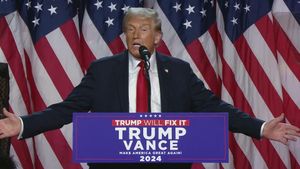President-elect Donald Trump has once again set the stage for debate over the future of the U.S. Postal Service (USPS), expressing openness to the idea of privatizing the agency during his recent press conference at Mar-a-Lago. Trump's comments come at a time when the agency is grappling with significant financial losses, amounting to $9.5 billion for the fiscal year 2024, and reflect his long-standing criticism of USPS operations.
During the conference, Trump remarked, "Privatizing the Postal Service would have disastrous consequences for the Americans and businesses who rely on USPS every day," as he weighs potential reforms aimed at addressing the agency's financial woes. Trump indicated his administration is seriously considering privatization as part of broader efforts to curtail government spending. After meeting with the current Postmaster General Louis DeJoy, the president-elect underscored the importance of reforms to restore USPS's financial sustainability.
The conversation has not gone unnoticed among lawmakers, particularly with some, like Rep. Gerry Connolly, D-Va., already sounding alarms. Connolly expressed deep concerns about how privatization could jeopardize USPS’s ability to provide universal service, which has traditionally ensured mail delivery to all Americans irrespective of their geographic location. "When you go private, the profit motive is everything," he stated, pointing out the risks of diminishing service quality for rural communities.
Trump's potential shift toward privatization has intriguing supporters — most prominently tech billionaire Elon Musk. With his influence, Musk has seemingly endorsed the concept, voicing his support for allowing Americans the option to forego physical mail. Recently, he even responded positively to calls for privatization via the social media platform X, emphasizing the idea as feasible.
Despite these discussions, the path to privatization remains complex. Any significant overhaul of USPS would likely require Congressional approval. Given the bipartisan hesitance to privatize during Trump’s initial term and the pushback from rural lawmakers, it is uncertain whether sufficient Republican support would materialize now. Many GOP representatives rely upon their constituents' need for dependable mail service, raising questions about the political feasibility of Trump's privatization push.
Added complications arise from the nature of USPS's funding and operational obligations. Although the agency is largely self-funded through postage, it still relies on federal assistance and upholds a universal service mandate, ensuring affordable access to mail delivery across the nation. Full privatization could risk heightened prices and inconsistencies in service, which both critics and proponents acknowledge.
Trump’s remarks about USPS come amid growing scrutiny of Postmaster General DeJoy, introduced to the national stage during Trump’s first term. Back then, DeJoy faced backlash from Democrats for implementing reforms perceived to undermine mail delivery during the 2020 election, sparking concerns over election integrity. Now, as Trump re-enters the conversation around USPS’s future, DeJoy remains at the helm, acting as both ally and target of scrutiny from both sides of the aisle. His financial management strategies have not instilled confidence, with critics pointing to them as detrimental to mail service reliability.
For their part, those advocating for privatization argue it could alleviate USPS’s long-standing fiscal issues. They point out the potential for increased revenue, technological innovation, and enhanced services should USPS shift to accepting private capital. Proponents assert this could place the agency on more stable financial footing, free from convoluted government financial stipulations.
Nevertheless, the consequences of such decisions will weigh heavily on many households and businesses who rely on USPS services every day. Rural areas, which benefited strongly from Trump’s previous election campaigns, could stand to lose major advantages, as they rely on USPS for consistent and affordable mail delivery. Trump’s potential reforms could inadvertently impact some of his core supporters, raising questions about the intersection of fiscal policy and electoral strategy.
Over the coming months, as Trump finalizes his plans and outlines potential actions vis-à-vis USPS, the stakes are high for both him and the agency. The coming debates over privatization will likely shape not just postal policy, but also the nuances of governmental responsibility, the balance of innovation versus accessibility, and the future operational framework of one of America's oldest institutions.
With the National Association of Letter Carriers and other postal unions already threatening to oppose privatization, and with so much at stake, the outcome demands attention from both supporters and critics. Where will the delicate balance between fiscal responsibility and public service land the USPS? Only time will tell as Congress and the public weigh the potential risks and benefits of Trump's proposals.



